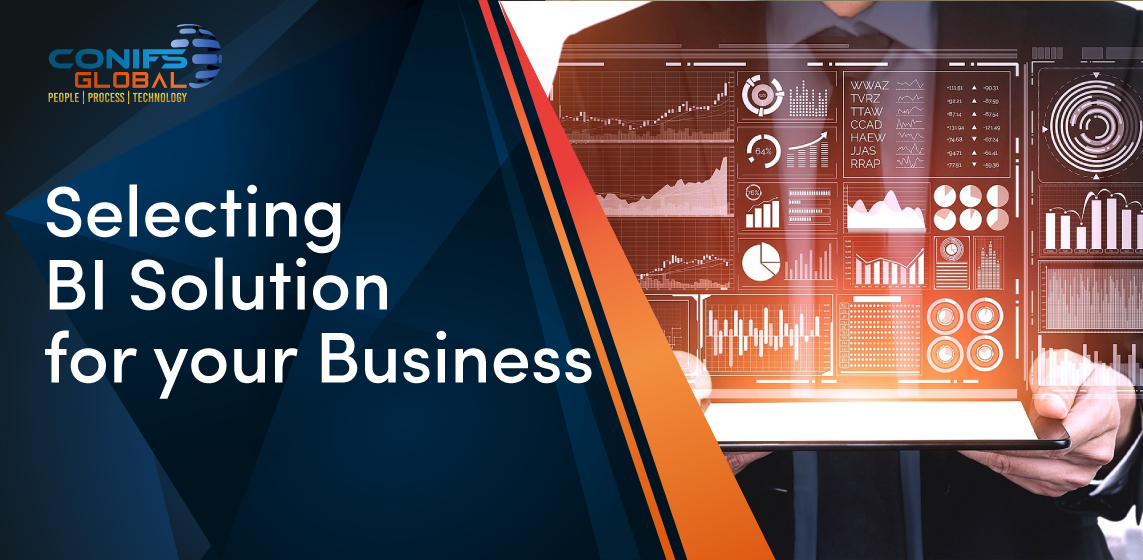Companies may build products, analyze their advertising efforts, customize content, and create content strategies with the aid of data analysis. Data analytics can ultimately help firms increase performance and boost their bottom line.
Main factors to be aware of when selecting a BI solution for your business.
- Ability to meet specific business needs
- Ease of use
- Cost for BI Solution
- Technology to be used
- Time Estimation
- Limitations of BI solution
- Product Scalability
- Product Security
- After service
- Globalization growth
What kind of data do you want to analyze:
Before choosing the right BI tool, you need to know what kind of data you want to analyze. That is because different BI dashboards are designed for diverse types of data analysis. For example, suppose you want to analyze transactional data (e.g., sales transactions). In that case, a business intelligence tool designed for analyzing transactional data will be more useful than one designed for analyzing social media or other unstructured data sources. You should also think about if your company requires numerous platforms to manage different sorts of data or just one platform to handle all data. For instance, your company might need two different platforms if it must analyze and visualize both transactional and social media data. However, if it only needs to evaluate transactional data, a single platform should be adequate (e.g., sales transactions). The screening process will go much more smoothly if you define your BI tool’s purpose clearly.
Ability to meet specific business needs:
There are eight areas to be evaluated.
- Access data and create new dashboards: Access the data you need to build interactive dashboards without technical assistance. Technology helps users to develop dashboards in a low code manner.
- Customize existing dashboards: Easy to use tools to manipulate and visualize data exactly how you want.
- Drill into reports: Zoom into details and underlying data for enhanced analysis. Can add color rules. When needed, the report can warn the reader from colors.
- Interact from mobile: Share and analyze with dashboards directly from any mobile device. Today it supports various mobile operating systems. (Android OS., Apple iOS., Blackberry OS.)
- Data visualization: Capability to automatically transform data into Line charts, Area charts, Bar and column charts, Doughnut charts, Funnel charts, Gauge charts or other types of visual presentation.
- User-friendly interfaces: All the features of the BI must be easy to access. Also, mobile environments should offer responsive touch interfaces in a native app.
- Analytical capabilities of the BI solution: It maximizes the opportunities for your organization.
- Checks Business Validations: This will ensure that business validations are followed correctly. Otherwise, the system can send alerts.
Ease of use:
- Accessibility, flexibility, and availability: A BI solution should be easy for users across the organization to access whether they are in the office, working remotely, or on the road.
- Easiness to train team members/employees to use the solution
- Self-service capabilities: A good BI solution must be designed for businesspeople to use on their own as a self-service solution.
- Easy navigation across the solution: BI solution should be easy to navigate with point-and-click or drag-and-drop features. It should give users a choice of doing a task themselves or employing automation to handle it.
Cost for BI Solution:
- Accessibility, flexibility, and availability: A BI solution should be easy for users across the organization to access whether they are in the office, working remotely, or on the road.
- Easiness to train team members/employees to use the solution
- Self-service capabilities: A good BI solution must be designed for businesspeople to use on their own as a self-service solution.
- Easy navigation across the solution: BI solution should be easy to navigate with point-and-click or drag-and-drop features. It should give users a choice of doing a task themselves or employing automation to handle it.
Cost for BI Solution:
Most BI tools have an initial cost, but there are also recurring expenses related to using them. These consist of maintenance expenses, consultation and training expenditures, and license renewal fees. Take a note that costs vary from one vendor to another, but here are some things you can expect to pay for:
- Pricing models: Some vendors charge per seat or per user, while others charge by the number of data sources in the system. The latter model is often more expensive because it requires more customization.
- Licensing fees: These fees may be based on the number of users or seats. Some vendors offer multiple license levels — such as basic, standard, or enterprise — and charge accordingly.
- Data management fees: If your organization needs help setting up datasets and loading them into the system, expect to pay extra for this service.
Any more information or demo we are willing to help Contact us
– Heaven Gunarathna




